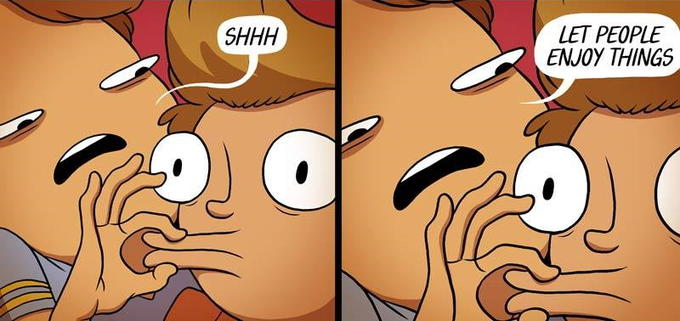i always got mad, as long as i remember because WHY would they change it if IT WORKED FOR ALL MY LIFE
god damn it
In order to make you walk around the store more giving you more opportunities to buy stuff you didn’t intend to buy
i don’t care I’m gonna buy my whatevers and I’m out of there
it’s their fault then that i have to run through the store to get to it
They call that a win/win. Worst case you continue to do business with them and buy what you intended. Best case you do even more business with them!
Local Asian markets don’t rearrange.
deleted by creator
Not to mention, with the in store employees who are shopping for customers now, I can tell you at my store it would regularly take months to update the new locations of items in the system, that’s at a Kroger…
As a career manager in a grocery store, I’m just getting a kick out of the conspiracies here over why stores reline products or display items on cardboard shippers. I want to hear theories on why end-caps tend to change each week.
Easy. Manufacturers pay for endcap displays and choice shelf space. It’s advertising for them. (source: I work for a brewery, and that’s how they put together the beer aisle. I’ve seen the software used to build the shelf arrangements.)
I’ve always assumed it’s to keep you browsing. You might notice something you’d otherwise usually walk straight past.
That and they monitor how people shop and create heat maps of where people move. If one part of the store is underused and others are overused they might shuffle around and see if they can improve on the cold parts by putting them where people go or on the way to the stuff people actually want to go to.
shouldn’t be allowed
It’s their damn store, they own the place. Why shouldn’t it be allowed?
Because it’s scummy and inconvenient.
Yeah I’m big on shutting down anti-consumer practices. I don’t want to restrict people’s ability to shift around their inventory, but if you’re heat mapping and psych consulting to boost the time people are lingering, it toes a line.
It’s inconvenient, but not scummy. Every business tries to increase its bottom line and this is not high up at all in the scumminess scale. And a heat map can be created without actually monitoring people but just by looking at sales vs placement. It can be done in a completely unobtrusive and privacy respecting way.
Just to be clear, I also get upset when my grocery store changes things up. It throws our shopping routine completely out of whack and causes more people in the store because everyone spends more time looking for their regular stuff.
It’s certainly not high on the scummy scale, but I would argue that any practice meant to control people’s behavior in order to increase sales is, as a matter of principle, scummy.
Because it’s psychological manipulation and it’s damn disgusting ! Forces people to buy things on impulse and keep polluting by overconsumption.
To force people to spend more time shopping. More time means more chance for impulse buying and better sales. Basic marketing.
I will keep this in mind next time my store rearranges things.
Thank you.
That’s also why they have those goddamn cardboard displays of random bullshit standing in most aisles. They form choke points that slow you down in front of the shelves.
I call those cleanup in isle whatever isle the display is in.
More time also means your appetite is starting to get engaged, since it’s usually after work and you’re surrounded by attractively laid out foods. It’s just a fact that people buy more if they’re hungry.
So even if you just went to pick up a bag of milk on your way home, maybe some other stuff looked good too while you were there.
They do it to make you spend more time browsing. Shoppers typically get the same stuff every time they get groceries. Over time people learn the layout of their local store and develop efficient patterns to move through it and get everything they want. When the store shuffles everything around they force shoppers to wander around the store and to look at all the shelves carefully for the stuff they actually want. Some percentage of them end up finding new things to buy and spend more money.
Literally trying to disorient shoppers like rats in a fucking maze, truly capitalism is not dystopian in any way!
Eh, it’s food, there’s only so much I can eat. So it’s not as if I’m going to suddenly buying more food because I’m walking around the grocery store. Even if I did, it would be longer before I’d need to go back and get more food.
I think it’s more down to certain brands paying the grocery store to have their products placed in more prominent places. So yeah people will buy different things, but not more. But if it’s more Brand X instead of Brand Y, Brand X makes more money and kicks back some of that to the grocery store.
I can’t guess what individual people will do but, as a group, shoppers end up spending more this way. Supermarkets and grocery stores typically sell many things besides food; toys, magazines, beauty products, etc.
The store also doesn’t need you to eat all the food you buy. If you throw out a bunch of food, as many people frequently do, the store still gets paid for all of it.
People buy more. It increases sales, it’s not some secret. They may not buy more forever but a couple items is enough.
The brands aren’t paying stores to do that, most grocery stores have very little interaction with brands directly and just order from warehouses.
Grocery stores don’t have interaction with brands? Are you sure? Why do you think most them have discount cards? It’s not because they’re being generous.
The discount cards allow them to sell that data to market research companies who analyze which products are often purchased together. They use that data to determine the optimal places to put the products.
You get that discount in exchange for allowing them to track what you buy. The money they make from their interaction with various brands exceeds the discount they offer with those cards, otherwise they wouldn’t be offering those discounts.
That’s a great example of indirect brand interaction and how various brands perform market research without involving grocers.
If they wanted a grocery store could just sell that data. Discount cards guarantee that a given shopper buys their merchandise instead of another brands. Your use of they is ambiguous in this context.
Larger stores, like say Walmart or albertsons, are far more likely to have direct deals with brands. Smaller stores often will with in particular local brands bit it depends on the specifics. Your run of the mill grocer, rarer and rarer these days, probably has very little direct interaction in the way you are suggesting. It’s certainly not why stores reorganize, when that is demonstrably because that just boosts sales.
Go chat with managers who do procurement at a grocery store, this isn’t secretive conspiracy stuff, it’s all just out there.
The average amount of food I buy should be, on average, the same as the amount of food I consume, but the amount of food purchased during a given shopping trip varies, especially in the amount spent on nonperishables. I am likely to buy a lot of a given item, store the extras for when I need them, and buy more when I run out.
If I am wandering around the store, I may see an item (like a snack) that I am interested in trying and pick some up. In doing so, I am slightly delaying the next time I need to buy more, but it is an overall gain for the store since they are getting my money earlier and the future stock up trip may be from a different store.
Also if there’s something new in a spot you’re used to looking for a regular purchase in, you’re more likely to notice the new item, and thus buy it - in addition to the thing you were going to buy anyway.
Some people in these comments are acting like we don’t make decisions while we’re shopping.
Some people will definitely buy more. One look at global obesity rates shows that people don’t buy less food just because they don’t need to eat that much. He/she didn’t say everyone would buy more, just some percentage. You’re obviously not part of that percentage, which is great. But it doesn’t have to be many who do to make the effort of rearranging worth it for stores. 1% of people buying more means millions of dollars for a big box chain that does hundreds of millions in sales every year.
But ultimately it’s a combination of things. Some buy more. Some buy different brands they don’t usually buy. Maybe those brands have a few more in the package than other brands and people unwittingly buy more. Maybe they try an entirely new product line they’ve never tried and it becomes a new normal thing.
As an adult it makes me mad mostly because I know I’m being played and being made intentionally less efficient but I have to deal with it anyway because I don’t really have a choice.
If they mix up the layout you’re forced to look at more products instead of automatically going to the places you expect a product to be. It’s a marketing tactic.
There’s more reasons than that but if it’s definitely one of the bigger reasons a small stock change can trigger a total mix up of the whole aisle.
It’s also why stores are more and more being designed like mazes, without clear signage, and with related products spread far apart. They inconvenience you specifically to extract money from you.
I’ve always found it funny, because they’ll move it again next year, and its pointless. Self-important supervisors changing stuff to feel important. Somebody thought it was important 🤣
It’s far from pointless, these large companies hire psychologists to help them with the layouts of their shops. They tend to move staples around so people have to look around for them increasing the chances they’ll spot something they don’t need but will buybon an impulse. I used to work for one of the largest supermarket chains in the uk, they have an empty store that they use just for planning the layout of goods. Alot of time and money goes into these decisions.
I really want to find out who these psychologists are studying to come up with these findings. Anytime the layout changes or items are placed in obtuse places that make no sense I just get pissed off. I start brisk walking and scanning the aisles faster than normal and ignoring stuff even more. A lot of times I just say screw it and leave without buying anything out of spite. Then go buy the item elsewhere. A month or so later after they move all the stuff around again, I’ll randomly find the item in the dumbest place ever, but no longer need it now.
Like I don’t want to be shopping, I hate navigating around idiots that block entire aisles for no reason. It’s not a leasurely or fun experience. I understand why they want me to stay longer, but they don’t seem to understand that no matter how many times I look at the same stupid products my wallet and the lack of fucks I give about their stupid products far outweighs the amount of time I stare at it.
So tired of of having my time wasted by marketing analytics that report a 1% increases if such and such stuff is done. Makes me feel like I’m trapped in an MMO with only hardcore players who optimize their builds for the smallest negligible increases. It’s exhausting
Wait, you’re onto something here. If you think about it, our entire society is an mmo. The tryhards optimise the fun out of it for everyone, you have to have a competitive edge over other players to succeed in any workplace, it’s very pay to win and if you’re just a Joe Schmoe wanting to take it easy and casual, you’re seen as worthless and have no chance to actually do any of the fun activities due to gatekeeping. Huh
We’ve cracked the code. The Matrix is real, it’s all just a shitty P2W MMO!
But it doesn’t really matter what you do. What matters is if it makes the company money, usually meaning what a sizable number of other people do. Even if you spend less, if 5 other people spend more, that’s why companies would want to do it.
I don’t think this is the only reason though. I think it’s also to keep the store feeling like a new store. They want shoppers to feel like they’re getting new experiences every now and then. They don’t want to be stale. It’s like how many people rearrange their furniture every few years. Change gives feelings of novelty. Sure, you could buy a new couch, but just changing which walk the couch is against is a cheaper alternative.
I agree but it’s been shown that simple tactics like releasing fruit scent (melon particularly) can increase sales by as much as 10%. I’m not sure if it’s known exactly why this occurs but you can see why a shop would try various methods to increase their sales. Maybe altering the layout makes enough people change their habits to increase sales that it’s worth confusing/irritating those who aren’t affected by it?
You’re probably right and it’s worth it for them to do so. But at the same time I’ve also come to realize that companies are fucking stupid.
On multiple occasions at multiple jobs I’ve worked. I’ve watched managers implement awful policies and procedures that percentage wise increased revenue in one sector but decreased it in another by a smaller percentage. However the sector that was decreased was orders of magnitude larger than the sector that got a percebtage increase. So in reality when it came to the actual Dollar amount we actually lost a fuckton of revenue for multiple years until someone spoke up about it.
Idk if that’s the case or not with this stuff. I’m just tired of feeling like every annoyance and detail in life is just another stupidly planned out attempt by a corp to try and manipulate another dime out of me
Here in the US, grocery stores of the same chain with the same corporate are all arranged wildly differently.
I just get stressed out and leave when it takes too long to find what I’m looking for…
I think maybe it’s pointless in the sense that the average shopper doesn’t think it influences them. Statistically, it does, but they may not feel like it does.
It’s still shitty, regardless of how effective it may appear. There’s a reason the common items are always spread out, as I’m sure you know. Can’t have someone grabbing milk, cheese, eggs, bread, and fruit all from the same section, then they’d miss the donuts and the cakes and the frozen pizas and the ‘managers discount’ almost expired meat section (I like almost expired meat, I’m poor too, but still)
I do like the yellow label section.
If only to witness everyone over 70 in the shop go from George A Romero to 28 Days Later in order to get first dibs on a 20p pack of Smart Price ham.
I’d love to know why they moved the kalamata olives from the section with pickled onions, gherkins etc to a section of shelving next to the pet food, along with other Greek foodstuffs such as antipasti, pesto and Bolognese sauce. Because that one really had me scratching my head.
It’s not even the local supervisors. It’s the ditsy bimbo at corporate who’s there because she’s got an okay ass to look at.
I’m more upset about places trying to charge $8 for a goddamn box of Cinnamon Toast Crunch.
Try buying actual food instead of garbage

This has the same energy as that meme with the guy learning the flute
One man’s trash is another man’s treasure.
Verily I say unto thee, the man who vieweth Cinnamon Toast Crunch as trash doth himself become trash. -Sun Tzu
So $12 for the healthy cereal then, got it. /j
Cause people who buy “actual food” never buy some snacks.
And also, suuuure, only the garbage food is the expensive stuff, riiiight?
The nutrients/$ ratio of garbage food makes it the most expensive
I saw Ryan Gosling at a grocery store in Los Angeles yesterday. I told him how cool it was to meet him in person, but I didn’t want to be a douche and bother him and ask him for photos or anything.
He said, “Oh, like you’re doing now?”
I was taken aback, and all I could say was “Huh?” but he kept cutting me off and going “huh? huh? huh?” and closing his hand shut in front of my face. I walked away and continued with my shopping, and I heard him chuckle as I walked off. When I came to pay for my stuff up front I saw him trying to walk out the doors with like fifteen Milky Ways in his hands without paying.
The girl at the counter was very nice about it and professional, and was like “Sir, you need to pay for those first.” At first he kept pretending to be tired and not hear her, but eventually turned back around and brought them to the counter.
When she took one of the bars and started scanning it multiple times, he stopped her and told her to scan them each individually “to prevent any electrical infetterence,” and then turned around and winked at me. I don’t even think that’s a word. After she scanned each bar and put them in a bag and started to say the price, he kept interrupting her by yawning really loudly.
Removed by mod
i guess you could call this copypasta ‘vintage’. it’s over ten years old.
A really great classic copypasta
reddit copypasta
Pretty sure this one predates reddit
The great thing is that before long there’ll be a deepfake of Gosling with AI voiceover that will document this exact event actually taking place.
I was the girl at the counter and I can confirm this happened.
Grocery store by me rearranged the store so that it was organized by country, instead of by type of product. Now there’s 4 individual locations to pick a bag of beans from because the red kidney beans from Iraq are sooooo muuuuuch different than the red kidney beans from costa rica.
I think that’s kinda neat actually. Like it sounds annoying, but as far as gimicks go it’s not the worst
Maybe stores that care about shopping locally should stock all the local products near the entrance, the interstate products beyond that, and the imported products right at the back. Encourage supporting local growers and producers, reducing transport carbon emissions, and make it real easy for the consumer to recognuze the difference
Studies show more time spent in the store equates to more sales. They have to measure time in store and extra sales against time to reorganize. As regular time moves forward it becomes increasingly worth more to rearrange until it outweighs the time to reorganize by a certain margin.
Or try doing your shopping in a store you’ve never been to before. That’s some Tomb Raider shit right there.
the real Tomb Raider were the stores we visited all along
Walmart keeps moving the Cheetos Jalapeno Popcorn. It’s like they don’t want me to buy it.
Soooo that may be the distributor for that since Frito lay generally stocks their own products. That popcorn be good though
They dont want you to die
Even the Disney store has a Frozen Isle now.
Don’t use the ATM. It will freeze your account.
Grocery chains have software for putting together shelf arrangements. Suppliers have to pay if they want their products at a quality location at eye level, or near the ends of the aisle. And of course pay more for things like endcap displays.

















